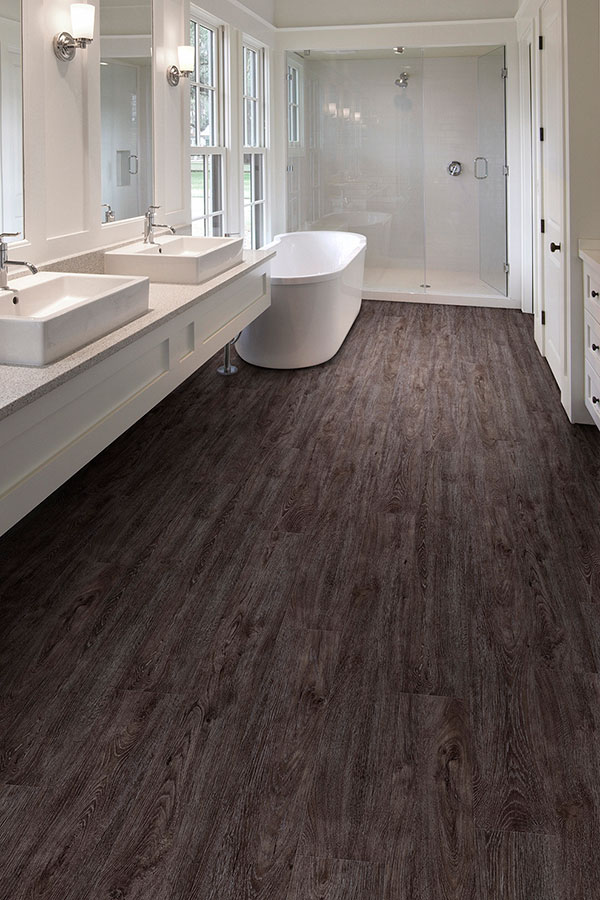Imagine walking into your freshly renovated kitchen, eager to admire your gleaming new vinyl flooring. But instead of the smooth, pristine surface you envisioned, there are strange ripples and bumps, ruining the look you worked so hard to achieve. This is a nightmare scenario for many homeowners, often caused by improper acclimation of the flooring. But with waterproof vinyl flooring becoming increasingly popular, the question arises: Does this fantastic material require acclimation? Let’s delve into the intricacies of vinyl flooring acclimation and uncover the truth about how to achieve a flawless installation.

Image: www.desertcart.ae
Acclimation is a crucial process for any flooring, especially those susceptible to changes in temperature and humidity. Essentially, it involves allowing the flooring to adjust to the environment of the room where it will be laid. This process helps the flooring stabilize, preventing warping, buckling, and uneven surfaces. But does this apply to all vinyl flooring? Does it apply to waterproof vinyl flooring, touted for its resilience and durability?
Waterproof Vinyl Flooring: An Overview
Waterproof vinyl flooring, often referred to as “luxury vinyl plank” (LVP) or “luxury vinyl tile” (LVT), is a revolutionary material in the world of flooring. Made from layers of vinyl, these planks and tiles offer a stunning resemblance to natural materials like wood, stone, and ceramic, making them an attractive choice for both aesthetic and practical reasons.
But the key to their popularity is their waterproof nature. This makes them ideal for high-traffic areas like kitchens, bathrooms, and basements. Unlike traditional vinyl flooring, which could easily be damaged by spills and moisture, waterproof vinyl flooring can withstand even the harshest environments.
What Exactly is Acclimation?
Before we delve into the specifics of waterproof vinyl flooring, let’s understand the concept of acclimation. Imagine a piece of wood taken directly from a cold warehouse and placed in a heated room. Sudden temperature changes can cause this wood to expand or contract, resulting in warping or cracking. To prevent this, acclimation allows the wood to slowly adjust to the room’s temperature and humidity, minimizing these unwanted changes.
The acclimation process for flooring typically involves storing the materials in their intended room for 48-72 hours before installation. This allows the flooring to reach a stable temperature and moisture content, minimizing the risk of expansion, contraction, or buckling after installation.
Does Waterproof Vinyl Flooring Need to Acclimate?
This is where things get interesting. While traditional vinyl flooring, known for its flexibility and adaptability, may not require acclimation, the case for waterproof vinyl flooring is a bit more nuanced.
Here’s what you need to know:
-
The Core Material: The core material of waterproof vinyl flooring is generally a rigid core that’s less susceptible to changes in temperature and humidity than traditional vinyl. This core provides greater structural stability, making it less prone to warping or buckling.
-
Installation Method: Waterproof vinyl flooring is often installed using a floating method, meaning it’s not glued to the subfloor. This allows for some movement and flexibility, reducing the need for acclimation.
-
Environmental Factors: The environment in your home plays a role. In homes with significant temperature fluctuations or high humidity, acclimation becomes more important, even for waterproof vinyl flooring.

Image: dragon-upd.com
Assessing Your Specific Needs:
Ultimately, the decision to acclimate or not depends on several factors:
-
The specific product: Consult the manufacturer’s instructions for your chosen waterproof vinyl flooring. Some brands may recommend acclimation, while others may deem it unnecessary.
-
The room’s environment: If you live in a climate with extreme temperature fluctuations or high humidity, acclimation may be advisable, even for waterproof vinyl.
-
The installer’s expertise: Experienced installers often have a good understanding of the product and the environment, and they can advise you on whether acclimation is necessary.
The Benefits of Acclimating Waterproof Vinyl Flooring:
While it’s not always mandatory, acclimating waterproof vinyl flooring can bring several benefits beyond preventing warping or buckling.
-
Smoother installations: Acclimation can ensure the flooring lays flat, preventing ripples or uneven surfaces. This leads to a smoother, more professional finish.
-
Improved longevity: Acclimation helps the flooring stabilize, minimizing the risk of damage from temperature or humidity changes, which could shorten its lifespan.
-
Reduced stress on seams: Acclimation allows the flooring to adjust to the room’s environment, preventing excessive stress on seams that can lead to cracking or separation.
Unpacking the Risks of Skipping Acclimation:
While acclimation is not always required, skipping it can lead to some potential risks:
-
Uneven surfaces: Flooring that hasn’t acclimated may expand or contract after installation, leading to bumps, ripples, or gaps.
-
Buckling and warping: Extreme fluctuations in temperature and humidity can cause the flooring to buckle or warp, creating an uneven surface and potentially causing damage.
-
Reduced lifespan: A non-accllimated flooring may be more susceptible to wear and tear, leading to a shorter lifespan.
Does Waterproof Vinyl Flooring Have To Acclimate
Conclusion: A Balanced Approach
When it comes to waterproof vinyl flooring, the need for acclimation is not a clear-cut decision. It depends on several factors, with the specific product, room environment, and installer’s expertise playing key roles. While it’s not always mandatory, acclimating waterproof vinyl flooring can bring numerous benefits. By assessing these factors and following the manufacturer’s instructions, you can make an informed decision, ensuring a flawless installation and maximizing the longevity and beauty of your flooring.
Remember, don’t hesitate to reach out to a professional flooring installer; they can provide expert advice tailored to your specific situation. With careful planning and a balanced approach, you can ensure that your new waterproof vinyl flooring is both beautiful and long-lasting.



/GettyImages-173599369-58ad68f83df78c345b829dfc.jpg?w=740&resize=740,414&ssl=1)


